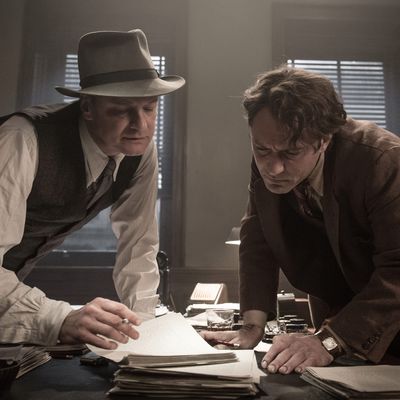
Is there any profession less cinematic than book editing? I say that with enormous respect, given that my wife edits books (and damn good ones). But in all the years I’ve watched her pore over manuscripts and wrestle over phrasing with authors both grateful and intransigent, and beam when that first printed book arrives in the mail (after so many hassles over covers and flap copy), I’ve never thought, This would make a great movie!
But the new film Genius does a pretty good job of capturing the peculiar drama of the relationship between editors and writers, in this case some of the most revered in American letters: Max Perkins, an editor at of Scribner’s, and, in alphabetical order, authors F. Scott Fitzgerald, Ernest Hemingway, and Thomas Wolfe. It’s the bond with Wolfe that occupies most of the movie’s running time. At the start, Perkins (Colin Firth) gets a fat manuscript plopped on his desk — a novel turned down by every other publisher in New York. He reads a few lines, then a few more. He reads on the train to his impressive Connecticut home and over dinner as his wife and kids visibly wilt from neglect. The book is the sprawling first draft of what would come to be called Look Homeward, Angel. Just as Perkins finishes, Wolfe appears at the door, uninvited and unannounced. As played by Jude Law, he’s a disarmingly extroverted Southerner, high on his own persona. And Perkins is oddly smitten.
So how do the filmmakers make editing cinematic? Perkins and Wolfe go mano a mano over booze and cigarettes. They edit while hurrying down the street. They edit in bars. Other male characters in movies play increasingly fierce squash. These guys do increasingly fierce rewrites. A description of a woman’s eyes goes from a logjam of metaphors to the simple observation that they’re blue. And to be fair, Perkins worries aloud near the end of Genius that he has straitjacketed his authors, paring away the passionate excess that made them unique. The movie lets that self-doubt hang, which is a good thing. Editors — even great ones — should always cut with humility.
But if you’re looking for something more than line editing, look elsewhere — perhaps to A. Scott Berg’s 1978 biography, Max Perkins: Editor of Genius. (The title, of course, is a double entendre.) You wouldn’t know from the film what Look Homeward, Angel is about, much less its author’s vision of the universe and the place of humans in it. The focus is firmly on length and on the emotional intensity of the haggling. Wolfe’s high-strung lover, Aileen Bernstein (Nicole Kidman), warns Perkins that he has been seduced and will be abandoned down the road, but Perkins — buttoned up, always wearing a hat — is not a man to worry about such a thing. It is beyond his purview.
Watching Genius, you might have the nagging sense that the most vivid stuff is occurring offscreen, when the other characters leave Perkins and go back to their messy lives. And while that might be the point — we’ve had plenty of self-destructive author biopics, but none that focused on people who tried to instill discipline in them — it makes for half-baked drama. It doesn’t help that the first-time film director, Michael Grandage (the artistic director of London’s Donmar Warehouse), has gone the British-prestige route. It’s terribly high-toned. And with the exception of Laura Linney in a minor role as Perkins’s wife, a middlebrow playwright, the actors are all Brits and Aussies. It’s as if Americans can’t be trusted to play quintessentially American literary figures.
Firth isn’t bad. In some ways, he’s perfect — as beige as the part demands. Guy Pearce isn’t a bad Fitzgerald, either, although he’s a controlled actor and doesn’t convey what a sniveling wreck the man was at the end of his talent. Dominic West is a solid Hemingway. Kidman gives a brittle, pungent performance as the Jewish costume and set designer who left her husband and two kids for Wolfe, but it seems as if her specialty has become getting by in parts in which she’s totally miscast.
For better or worse, Jude Law carries Genius. Does he overact? Perhaps, but he does suggest that it’s also Wolfe who’s overacting, putting on a grand show to keep his vulnerability at bay. Thank heaven Law gave up the leading-man game and went back to character parts, in which he always goes for broke. But neither he nor Genius is ingenious enough to make you think, We need more movies about editing!


